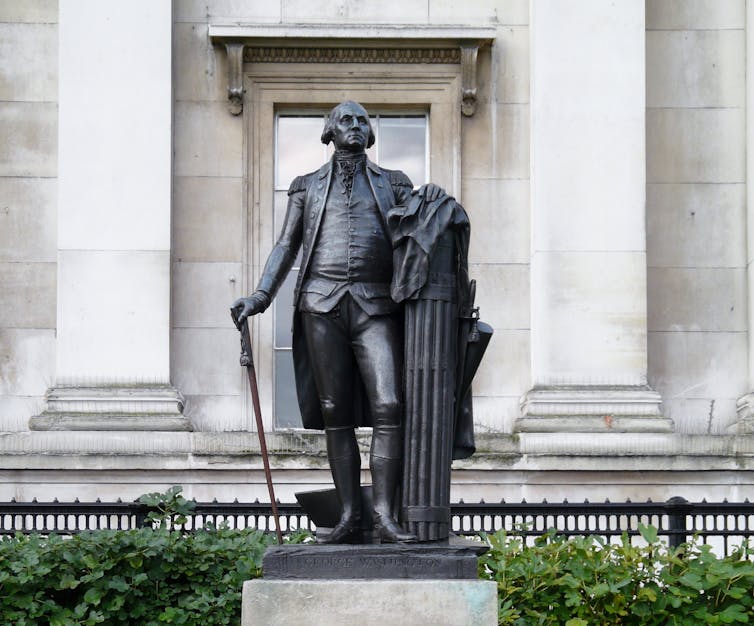- 200 years
- Study
- International
- Business and employers
- Research
- About us
Dr Sam Edwards says the commemoration may be more complex this year

Not as awkward as it looks. EPA/Shawn Thew
Originally published on The Conversation
by Dr Sam Edwards, Senior Lecturer in American History
This year’s July 4 celebrations will come freighted with rather more complexity than usual, and on both sides of the Atlantic too. 2018’s commemoration of independence from British rule will take place just nine days before Donald Trump crosses the Atlantic for talks with his British counterpart, Theresa May. The two will follow the annual celebration of severance with a performance of togetherness: as Independence Day makes way for the special relationship.
Given Trump’s remarkably poor grasp of history – this is a man who recently asked if the Canadians had burned down the White House in 1814 – he’ll quite probably be oblivious to any such tensions between the upcoming events of July 4 and those of July 13 (the date of his visit to London). But if his advisers take a glance at the history books to think through this coincidence of timing, they might be pleasantly surprised. While many Americans unambiguously celebrate July 4 as a national event marking independence from the “mother country”, in Britain the day has long been a chance to celebrate Anglo-American ties. How can it be both?
It all comes down to exactly how you understand the origins and cause of the American Revolution. For many Americans, the War of Independence was a righteous conflict against a tyrannical and perfidious enemy, the narrative of independence famously celebrated in films such as The Patriot. In this view, the founding fathers were exceptional and exemplary Americans, leading heroic yeoman farmers in the cause of national independence from the British Empire.
The problem with this idea is that it wasn’t until relatively late in the day, towards the middle of the 1770s, that colonial American leaders actually set themselves firmly on the cause of full independence. And even when they did, many still found it difficult to shed completely their identities as “Englishmen” overseas, while a significant proportion of the American population remained either loyal to the crown throughout, or tried to avoid choosing a side for as long as possible.
Hence why those leading the revolution were initially so keen to claim that they fought for the legitimate rights of “Englishmen”: not to be taxed without consent, the right to rule by elected representatives. Even George Washington, commander-in-chief of the Continental Army and later the first president, thought himself a loyal Englishman until well into the 1770s.
In later years, such ideas faded from view. Washington was elevated to the status of American demi-god, and during the 19th century, July 4 developed its modern form and function: an assertive national ritual which celebrated American difference and distinction. Even so, the older idea that independence was originally an “English” cause lingered here and there, embedded in the much celebrated language used by Thomas Jefferson in the Declaration of Independence (which suggested his schooling in certain ideals of “Anglo-Saxon” rights), in the structures of the US Constitution (including the two-house political system), and in the judicial system’s roots in English Common Law.
This all meant that when the US and Great Britain later developed increasingly close diplomatic connections, July 4 was ripe for re-interpretation.
The key moment came on July 4 1918, as Americans and Britons fought as allies on the Western Front. In London, various influential figures took the opportunity to revisit the history of American independence. For instance, Winston Churchill, later the most famous advocate for a “special relationship”, delighted in telling an audience of Anglo-American dignitaries that Britons were now “glad to know that an English colony declared itself independent under a German king”. As he gave this speech, government buildings across London and the British Empire proudly flew the Stars and Stripes.

British claims on American independence continued in the years that followed. In 1921, Lord Curzon, the foreign secretary, happily proclaimed Washington a “great Englishman” while dedicating a statue of the first president in Trafalgar Square. Much the same sentiment was heard a few days earlier when a gathering of politicians and diplomats opened Washington’s ancestral home in Northamptonshire, Sulgrave Manor, as an Anglo-American shrine.
By the time of the bicentennial of American independence in 1976, the British political elite were well prepared to meet the challenge of celebrating July 4. In a masterstroke of political symbolism, the government gifted to the US a copy of the Magna Carta. The message was clear: while Jefferson’s famous text appeared to mark a moment of transatlantic severance, in actual fact it revealed the deep history of the Anglo-American bond. The Declaration of Independence stood with the document signed at Runnymede in 1215 in the pantheon of English constitutional history.
Will a similar claim on American independence surface in the pronouncements and performances linked to Trump’s visit to Britain this July? May will surely follow precedent and celebrate the ties of the “special relationship”; Trump will likely bluster, reciprocate, and talk about his Scottish roots. But Trump’s brand of nativism has little time or space for expansive Anglophilia, and he and May have yet to find an ideological or personal affinity of the sort enjoyed by Margaret Thatcher and Ronald Reagan. This Independence Day, the special relationship may lose out.